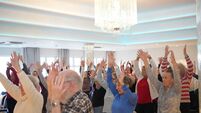Workplace welfare versus workplace wellbeing

Wellbeing is a culture shift, not just one session on a Friday afternoon, so says Dr Michelle O'Driscoll
HAVE you ever taken part in any workplace wellbeing sessions? What’s the difference between this and workplace welfare?
Dr Michelle O’Driscoll is a pharmacist, re searcher and founder of InTuition, a health and wellness education company. Her research lies in the area of mental health education, and through InTuition she delivers health promotion workshops to corporate and academic organi sations nationally. See intuition.ie







 App?
App?


